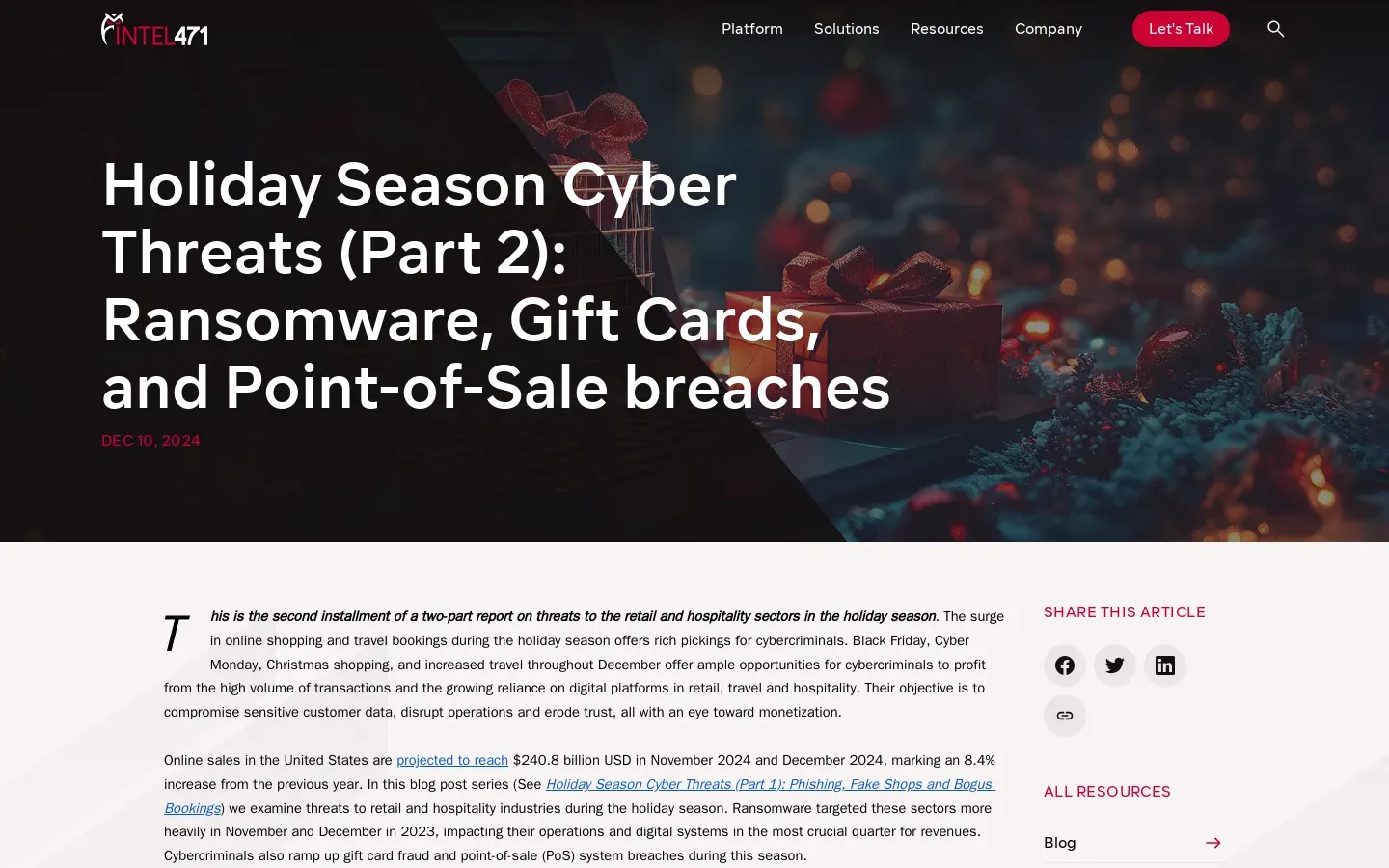
Cybersecurity Threats Increase for Retail and Hospitality This Holiday Season
/ 4 min read
Quick take - As the holiday season approaches, the retail and hospitality sectors are increasingly vulnerable to cybersecurity threats that can disrupt operations, compromise customer data, and diminish consumer trust, prompting the need for enhanced protective measures and awareness initiatives.
Fast Facts
- Increased Cyber Threats: The holiday season poses heightened cybersecurity risks for retail and hospitality, threatening operations and customer data.
- Research Objectives: The study aimed to assess the impact of cyber threats on business operations and develop effective brand protection and incident response strategies.
- Key Findings: Cyber threats disrupt operations, lead to financial losses, and exploit consumer vulnerabilities, necessitating enhanced education and awareness.
- Implications for Cybersecurity: A comprehensive, adaptive cybersecurity approach and collaboration among businesses for threat intelligence sharing are essential during high-risk periods.
- Future Directions: Emphasis on AI-driven threat detection, customer education, and cross-industry collaboration to improve responses to emerging cyber threats.
Cybersecurity Threats Loom Over Retail and Hospitality Sectors This Holiday Season
As the holiday season approaches, the retail and hospitality industries are bracing for a surge in cybersecurity threats that could disrupt operations and compromise customer data. A recent study has highlighted the vulnerabilities these sectors face during high-transaction periods like Black Friday and Christmas, offering crucial insights into their impact and potential mitigation strategies.
Understanding the Research Objectives
The study aimed to assess the impact of cyber threats on business operations and explore effective brand protection strategies. Researchers focused on how these threats compromise customer data and consumer trust, particularly during peak shopping times. Additionally, the study sought to develop robust incident response plans tailored to holiday-related cyber threats and enhance customer awareness regarding prevalent scams.
Methodological Approaches
To achieve its objectives, the study employed a comprehensive methodology:
- Data Analysis and Incident Tracking: Researchers monitored incidents to understand the nature and frequency of cyber threats.
- Behavioral Threat Hunting: This involved actively searching for signs of malicious activity within networks.
- Threat Intelligence Integration: Real-time data on emerging threats was incorporated to bolster defenses.
- Employee Training and Awareness Programs: Staff were educated on cybersecurity best practices to minimize vulnerabilities.
Supporting strategies included brand monitoring services to detect fraudulent websites and advertisements, continuous network monitoring, and establishing employee reporting mechanisms.
Key Findings
The research revealed several critical findings regarding holiday-specific cyber threats:
- Operational Disruption: Cyber threats significantly disrupt day-to-day operations, leading to potential financial losses and decreased consumer trust during peak shopping times.
- Brand Misuse: There is an increasing trend of fraudulent activities targeting well-known brands, necessitating effective brand protection strategies.
- Customer Vulnerability: Many consumers remain unaware of prevalent scams, underscoring the need for increased education and awareness initiatives.
Implications for Cybersecurity
The findings have several important implications for the cybersecurity field:
- A comprehensive and adaptive approach to cybersecurity is essential, especially during high-risk periods like the holiday season.
- Collaboration among businesses to share threat intelligence could enhance overall security posture and collective defense against cybercriminals.
- Developing standardized frameworks for incident response planning and threat intelligence sharing can improve responsiveness to emerging threats.
Tools and Frameworks
The research discussed several tools and frameworks pivotal in addressing holiday-specific cyber threats:
- Advanced Threat Detection Systems: These systems enable organizations to identify and respond to threats in real-time.
- Enhanced Cybersecurity Training Programs: Tailored training for employees is crucial in building a responsive workforce.
- Integration of Cyber Threat Intelligence (CTI) Platforms: CTI platforms provide actionable insights to bolster defenses.
- Behavioral Analytics for Insider Threat Detection: Utilizing behavioral analytics helps identify potential insider threats before they escalate.
Future Directions
Looking ahead, several future directions for research and application have been proposed:
- AI-Driven Threat Detection and Response: Leveraging artificial intelligence can enhance the speed and accuracy of threat detection.
- Enhanced Customer Education and Engagement: Increasing efforts to inform customers about cybersecurity risks and safe practices during the holiday season is vital.
- Cross-Industry Collaboration for Threat Intelligence Sharing: Developing standardized protocols can facilitate quick communication about emerging threats among organizations.
As retail and hospitality sectors gear up for the holiday season, these insights underscore the critical need for fortified cybersecurity measures, proactive education, and collaborative efforts to protect businesses and consumers alike from rising cyber threats.



